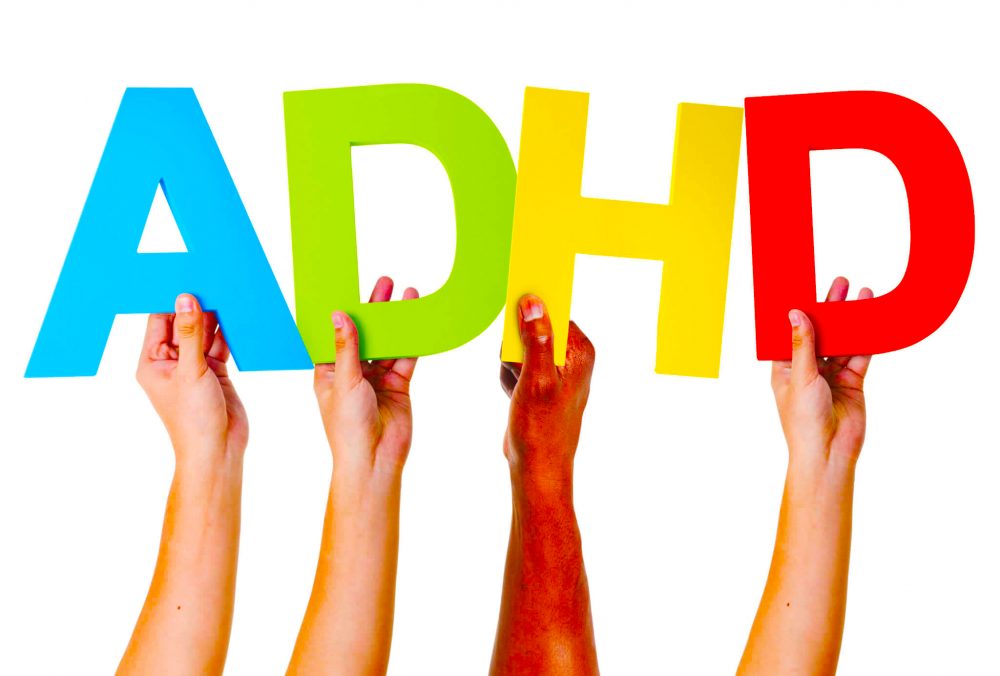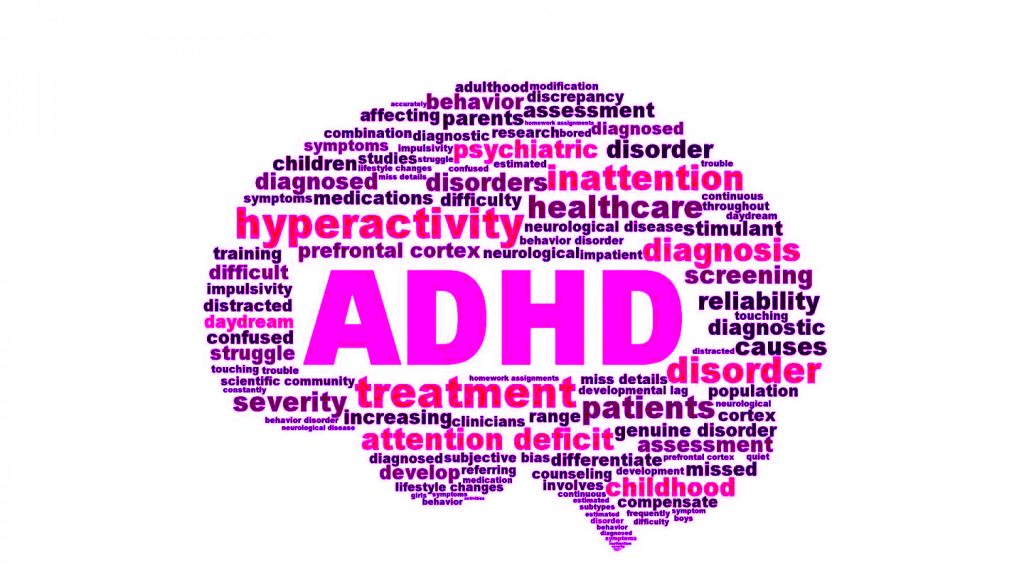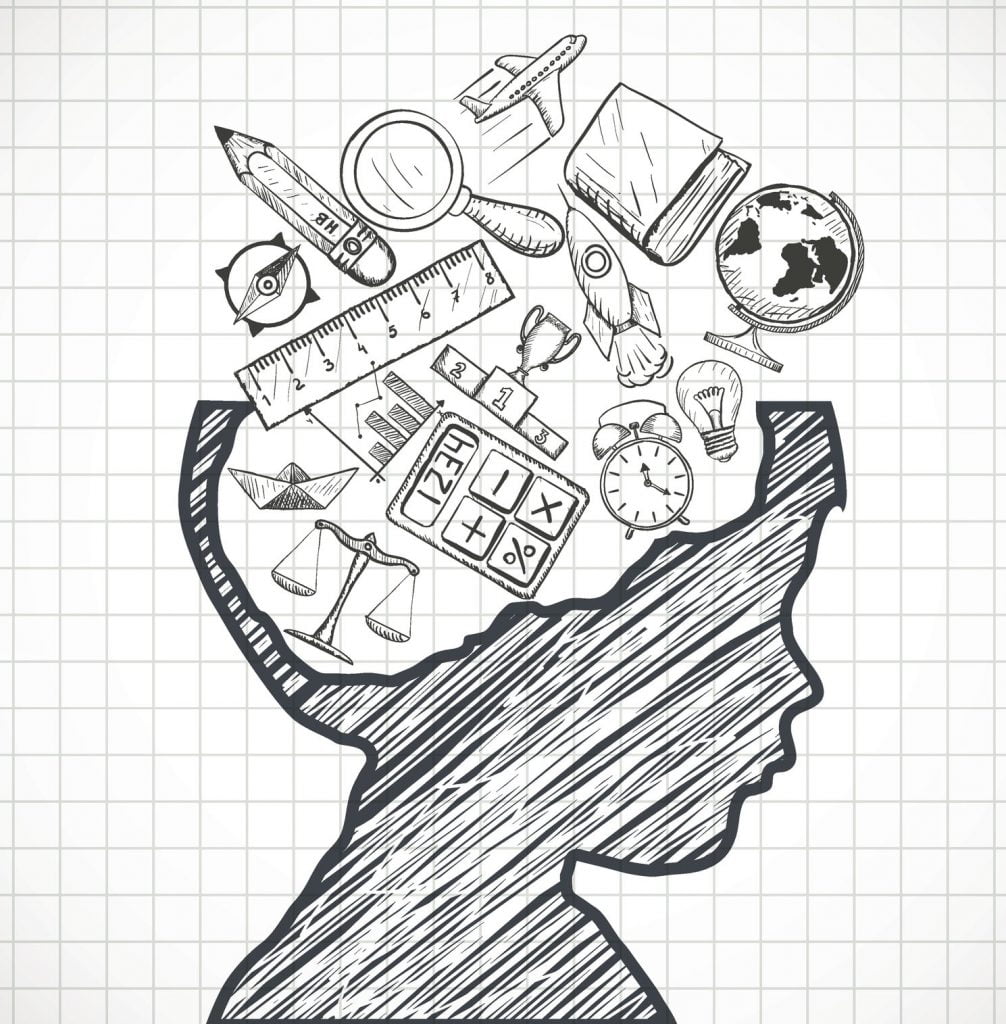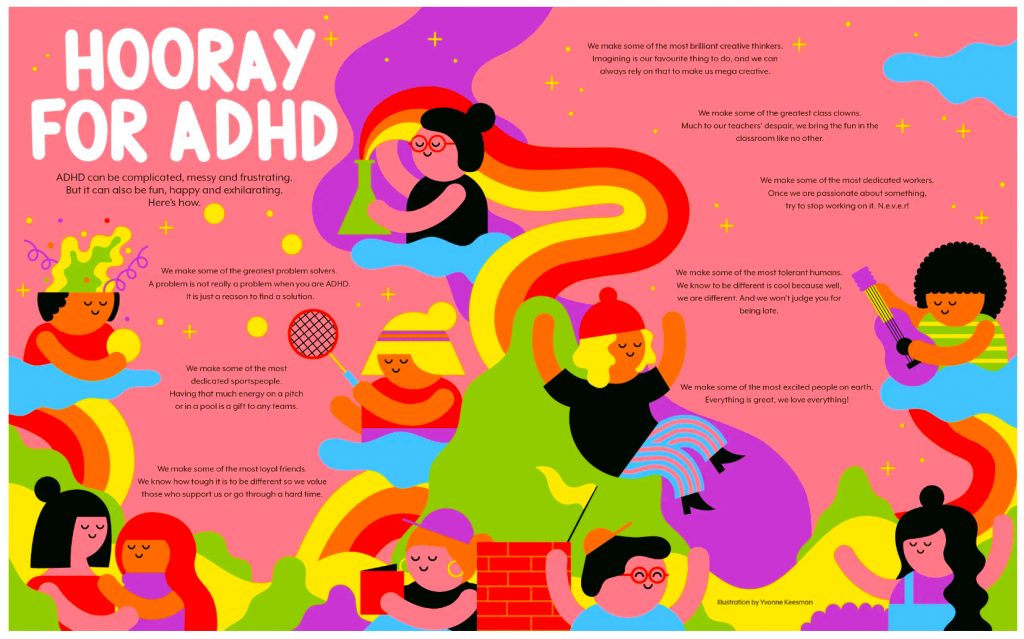ADHD – The Guide for Parents in the UAE 2021. ADHD Awareness Month Special.
Background. ADHD. The Guide for Parents in the UAE 2021.
As part of ADHD Awareness Month, SchoolsCompared explores the issues and shines a light on ADHD.
What Is Attention Deficit Hyperactivity Disorder? Commonly known as ADHD, it is a neurobiological disorder, which is attributed to an imbalance of the neurotransmitters in the brain. In laymen’s terms ADHD is a difference in the brain’s development that affects attention, the ability to sit still and self-control. It is not considered a learning disability in itself. However, it does have a negative effect on the person’s ability to concentrate, on their perception and their impulse control, which can make learning difficult.
(Although one disorder does not cause the other, according to the Centres for Disease Control and Prevention (CDC) 50% of people who have ADHD also have Dyslexia. Learn more about Dyslexia here.)
The term ADD (Attention Deficit Disorder) is often used interchangeably with ADHD, basically speaking ADD is a form of ADHD, minus the hyperactivity element.
It is estimated that around 4% of people worldwide have some degree of ADHD.
Brain Function and Structure
Studies involving MRI scans of the brain have shown that those with ADHD have areas of their brain that are different to those without it. In particular, the regions of the brain associated with movement, cognition and emotion were found to be smaller. This suggests a longer development period for kids with ADHD and explains some of the impulsivity and lack of inhibition that they display.
It is thought that 5% of school aged children in the UK have ADHD, 60% of whom will continue to display symptoms into adulthood. Children do not grow out of ADHD, but with the right treatment and support; they can manage their condition to the extent that they would no longer meet the criteria for diagnosis once they have reached adulthood.
What Causes Attention Deficit Hyperactivity Disorder?
The exact cause of ADHD is not fully understood and research efforts continue, however genetics, environmental factors and issues with the central nervous system at key developmental stages have so far been identified as most likely influencers.
Higher Risk groups: There are three groups of people who are more likely to be at risk of ADHD, however there are people diagnosed with ADHD who do not fit into any of these categories:
- Those born prior to the 37th week of pregnancy or are born significantly under the expected birth weight.
- Those with diagnosed with epilepsy
- Those with significant brain damage that occurred in the womb or those who suffered a sever head injured later in life.
Research indicates that Genetics are the most common causal factor: As with many learning disorders or predispositions, ADHD tends to be an affliction that runs in families. In most cases it is thought to be a genetically inherited trait. Research indicated that parents and siblings of a child with diagnosed ADHD are more likely to have the condition themselves, as 50% of the children from parents with ADHD also have this disorder. Although, it is important to point out that genetics is hugely complicated and ADHD cannot be linked to a single genetic attribute.
Social And Environmental Factors
There are theories that a child’s environment may cause the genetic condition to manifest or worsen, such as a extreme lack of structure or routine, impaired living conditions, excess/constant media consumption, and/or impaired family structure.
Common Indicators of ADHD
Most children at some point in their lives, through the stages of development can, at times, struggle to pay attention, to listen, to follow instructions and directions, to sit still or to wait for their turn.
But for children with ADHD, the struggles are severe, harder to manage and are far more frequent.
Children with ADHD may display signs or indicators from any or all of the following categories.
- Inattentiveness: A lack of focus or ability to be very easily distracted is a common sign of ADHD. The child may have trouble focusing and remaining on task, they may find listening tough and do not respond correctly to clear instructions. They may miss vital details from clear directions and they tend to not finish what they have started. They may appear to daydream or dawdle more than seems ‘normal’. They may be absent minded, forgetful and often lose track of their belongings.
- Hyperactivity: Children who are hyperactive and fidgety, restless and very easily bored by activities that most find engaging. They may have difficulty sitting still or staying quiet. They tend to rush through tasks with the aim of just getting it finished without attention to detail and with many careless mistakes. They may show an inclination toward climbing, jumping, and wrestling at inappropriate times and have the tendency to disrupt activities or disturb those around them.
- Impulsiveness: Children who are impulsive act without thought or consideration for the consequences. They may interrupt repetitively, push or grab for the things that they want and find it very hard to simply wait or be still. They are more likely to take items without asking for permission, use belongings that aren’t theirs without thought and to take unnecessary, unconsidered risks. They may have emotional reactions that are far beyond what the situation calls for.
Sometimes parents and teachers notice signs of ADHD when a child is very young. It is normal for little children to be distractible, restless, impatient, or impulsive. These things do not necessarily mean that a child has ADHD.
As children grow and learn they develop the ability to increase their attention span and improve their self-control. However, when a child’s inattentive, hyperactive and impulsive behaviour appears to be in excess or their behaviours starts to cause problems at school, at home or with friends, it may be time to consider whether they have ADHD.
ADHD As A Spectrum Disorder
Joel Nigg, Ph.D., Professor of Psychiatry at Oregon Health & Science University has identified ADHD as a disorder that is complicated and nuanced, that can manifest in different ways.
“Some kids are anxious. Some are angry. Some don’t have problems with emotions, but can’t pay attention. ADHD is variable. Children with ADHD appear to exhibit different profiles of emotional regulation and attention problems, perhaps associated with different patterns of maturation of brain networks. The ADHD brain is quite different.”
The Plan. What To Do If You Think That Your Child Has ADHD?
Step 1: Get An Official Diagnosis
ADHD is a medical disorder that requires a medical diagnosis. Parents should reach out to the many support groups (detailed below), their school if applicable and their paediatrician to ensure that their child receives a professional assessment from a fully qualified source.
In order to get an accurate diagnosis, clinicians should gather information from a variety of people who have interacted your child, including you, other caregivers, and teachers. A ratings scale, such as the ‘SNAP’, the Child Behaviour Checklist, or Connor’s Checklist, will be filled in to collate and assess the frequency and intensity of symptoms over a period of time.
Vera Joffe (Ph.D. ABPP) is Board Certified in Clinical Child and Adolescent Psychology and is certified as a therapist in PCIT (Parent Child Interaction Therapy). She believes that getting a diagnosis is vital to successfully treating a child and the earlier the intervention the better the potential outcome.
“Early diagnosis and intervention may lead to more effective, successful and hopefully, shorter treatment. In addition, the brain’s ability to change in response to experiences is much higher in early childhood.”
ADHD can be diagnosed by:
- Paediatricians
- Psychiatrists
- Clinical psychologists
- Social workers
- School psychologists/ Educational psychologists
Step 2: Treatment
There is no current cure for ADHD. However, there are a variety of treatments available with the aim of minimising the child’s hyperactive, inattentive and impulsive behaviour. Effective treatment can help a child to integrate into their changing environments, improve their communication skills and progress their learning skills in school.
Research shows that a combination of medication and behavioural therapy is the most effective treatment.
Behaviour Therapy is a broad term for therapy that seeks to identify and adjust potentially destructive or unhealthy actions, behaviour therapy functions on the concept that behaviours can be unlearned or altered. In terms of ADHD the therapy attempts to modify the child’s behaviour using targeted techniques and the therapist will utilise one, all or a combination of the below methods tailored for the individual child.
These include:
- Positive reinforcement: This is using immediate rewards such as sticker books or smiley faces to underpin and inspire appropriate behaviours.
- Punishment for negative behaviour: A similar idea to positive reinforcement, but in the reverse, the child receives immediate negative feedback prompted by their actions, such as the removal of stickers or a sad face in their behaviour chart.
- Prompting: Fundamentally, the therapist teaches the child new skills by providing step-by-step instruction for completing tasks or transitioning between tasks. The prompt gradually fade over therapy sessions until the child can complete the required action independently.
- Practice correct behaviour: Repeatedly practicing the correct behaviours until the action becomes automatic and overrides the previous actions.
- Cognitive methods: Using targeting questions, the therapist prompts the child to monitor and assess their own actions, to improve self-assessment.
- Social competency training: Children with ADHD often struggle in social interactions. This type of therapy works on interpersonal skills, self-confidence and communication.
In usual circumstances, medication would only be considered if behaviour therapy intervention has not been significantly successful or if the child’s issues severely impacts their school and home life. (If the behavioural problems are extremely severe, medication will precede behavioural therapy).
The most frequently used medication’s active ingredients are stimulants (usually methylphenidate). The biology behind the medication is hugely complicated however, according to global research these medications:
- Improve transmission between nerve cells
- Address typical ADHD behaviour
- Do not sedate the child
- Do not effect their character
- Doses are adjusted for the individual child
There are side effects to the above ADHD medication so it is hugely important that parents collaborate and communicate with all of the health care providers to ensure that the medication and dosage is right for their unique child’s needs on a regular bases. (There are also non-stimulant medications available such for children who are impacted by the stimulant medications).
Step 3: Guidance and Support
Parent Training
Specific and targeted therapy and training for parents is a huge help when it comes to assisting parents in better understating the needs of their child. Parents are provided with coping strategies, principles, methods and responses that can see immediate improvements in family life. Parent therapy will also help parents to manage their own complicated emotions and to identify the best strategies for discussing the child’s ADHD diagnosis with their child.
What Should You Expect From The School?
With the correct support in the classroom, finding ways to accommodate different learning styles and focusing on boosting a student’s confidence, the impact of the condition can be enormously reduced so that the learner can thrive within school and in their future careers.
Classroom learning typically requires a child to sit still for extended periods of time, which is why it’s important to deliver information in broken down chunks when possible so that kids with ADHD find it easier to ingest and review. (Most children respond better to this approach, with or without ADHD). This also allows them to take breaks when they feel their attention span is reaching its limit. Teachers might consider pairing them up with a note-taking buddy at school and regularly allowing students to get up and move around the classroom to release excess energy. Taking a multi-sensory approach is helpful as it caters to audio, visual and kinaesthetic learners.
Educational or school psychologists are trained to specifically focus on child psychology in an educational setting. They use specialized knowledge and skills to work with students academically, emotionally, and behaviourally. If your school as an educational psychologist on their team (and many outstanding schools in the region do) they are uniquely positioned to strengthen student learning by supporting teachers’ efforts and in liaising with the student’s team of care givers. If there is not an educational psychologist directly employed by the school, care can be outsourced to private clinics.
Speak to your school SEN department to discuss your child’s specific learning requirements and to ensure that an appropriate Independent Education Plan (IEP) can be created. Although the Governing Body has mandated that all schools must accept applications of student of determination, some schools are better equipped to provide for SEN children than others. Should a parent feel that their child’s special needs are not being sufficiently met post enrolment then it may be best to move them to a school with the resources to better meet their needs.
Online Learning During Covid-19 For ADHD Students
Active, project-based, practical learning, as opposed to passive listening and reading is the best approach for ADHD brains. This can present some issues when it comes to having online only learning methods due to the current Covid-19 pandemic.
Below are 5 tweaks that will help the ADHD learner to cope in an online environment.#
1 – Use PowerPoint. – Speak to the school about utilising slide show presentations for delivering student’s assignments and as a tool for students to hand in their work. This allows them to focus on one slide at a time.
2 – Add motivators to learning. Try introducing physical games and movements into the learning process. For example, scrabble instead of traditional spelling practice or coloured M&Ms for counting.
3 – Try Audiobooks. Audiobooks are effective in engaging struggling readers and helps them to get past their reluctance to begin, whilst also removing the burden of visual processing.
4 – Use Timers. Lengthy, multi-part projects are a real challenge for those with attention issues. Setting a timer for 20-minute intervals breaks down the assignment into more manageable pieces.
5 – Draw the assignment out. When an assignment is first received, have the learner draw out all of their ideas instead of writing them down. This allows them to get their fast paced thoughts down more quickly and allows them to tackle each item bit by bit.
Help and Next Steps.
- The Brain Workshop: Jumeirah, Dubai, here. Here you will find intense, targeted cognitive skills training designed to improve attention skills.
- The Brain & Learning: Tecom 3, Dubai, here.
- Counsellors: Wasl Rd, Umm Suqeim, Dubai, here. Here you will find a KHDA approved training centre and counselling service.
- Parenting Educator: Kids First Medical Centre, Umm Suqeim, Dubai, here.
- Arabic parenting skills workshop: Parenting4good, P4G Trainers, here.
- The ADD/ADHD Support Group meets at Dubai British School. For more information email Rachel Jex at [email protected]
- Lighthouse Arabia offers a myriad of counselling services and meet up support groups for adults, children and families. More here.
- www.adhd-information.com
- www.additudemag.com
Bottom line – The SchoolsCompared.com Verdict on ADHD 2020
As a parent, managing children with ADHD can be tough. Really tough. But you are not alone. And there are many positives.
Although the sign and symptoms of ADHD can manifest as behaviours that have the potential to negatively affect a child’s success in school and an adult’s success later in life, it is hugely important to understand that children with ADHD commonly display other traits that can be enormous strengths all through their lives.
These include the ability to hyper focus, a tendency toward resourcefulness, and a huge amount of curiosity, above-average creativity and intuitive thinking. Those with ADHD are also often known to have quick thinking skills, great resilience, a positive attitude, and boundless enthusiasm for topics that interest them. They can be sensitive to the needs of others because they are greatly empathetic. Individuals with ADHD often have high energy levels, which can translate to a greater ability to persevere in the face of difficulty. It also gives them more vigour to participate with the world around them.
“Imagination is more important than knowledge. Knowledge is limited. Imagination encircles the world.”
Albert Einstein.
There are many people with ADHD throughout history that have had happy and engaging lives and have made important contributions to society. To name just a few, theses include, Justin Bieber, Simone Biles, David Blane, Richard Branson, Jim Carrey, Ryan Gosling, Salma Hayek, Henry Wrinkler, Jamie Oliver, Michael Phelps, Whoopi Goldberg, Thomas Edison, Benjamin Franklin, Leonardo da Vinci, and Wolfgang Mozart.
Our children with ADHD are in good company!
Whilst the inattentive, hyperactive and impulsive behaviours associated with ADHD can be tough for any family to cope with – and the resulting diagnosis can be frightening at first, many of us, as parents, find that once know what causes our child’s impulsive and erratic behaviour, we also feel a sense of relief. The relief of knowing that now we have a diagnosis, that we can get the appropriate support that our children need to effectively help them and improve their daily lives, cannot be understated.
We are not alone. There is a lot of medical help and support groups available to parents and children impacted by ADHD. As importantly, in the UAE all schools should be very well equipped to help children with ADHD to achieve their full academic potential.
People with ADHD have an outstanding capacity for enthusiasm, creativity, and spontaneity, bringing enormous amounts of joy to their friends and family. When properly recognized, with the right support, appropriate treatment and management, people with ADHD can go on to live entirely normal lives and even to excel. Whilst you may not hear it often, or often enough, ADHD children too often have something priceless that other children do not – an endless capacity to find interest in the very smallest things. That makes them, at their best, the most extraordinarily interesting and fascinating people.
Last, and definitely not least, they have something even more important and special – you.
© SchoolsCompared.com 2021. All rights reserved.
































































Leave a Response